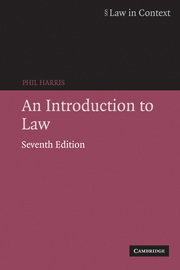Book contents
- Frontmatter
- Contents
- Preface
- Table of statutes
- Table of cases
- 1 Law and society
- 2 Law and morality
- 3 Law and the regulation of economic activity
- 4 Some important legal concepts
- 5 Law and property
- 6 Law and the settlement of disputes
- 7 The making of legal rules
- 8 The European dimension of English law
- 9 Liability in English law: the law of tort
- 10 Liability in English law: crime and the criminal justice system
- 11 The development and the role of the contract
- 12 Law and government
- 13 The legal profession
- 14 The judges
- Index
4 - Some important legal concepts
- Frontmatter
- Contents
- Preface
- Table of statutes
- Table of cases
- 1 Law and society
- 2 Law and morality
- 3 Law and the regulation of economic activity
- 4 Some important legal concepts
- 5 Law and property
- 6 Law and the settlement of disputes
- 7 The making of legal rules
- 8 The European dimension of English law
- 9 Liability in English law: the law of tort
- 10 Liability in English law: crime and the criminal justice system
- 11 The development and the role of the contract
- 12 Law and government
- 13 The legal profession
- 14 The judges
- Index
Summary
The importance of legal concepts will already be appreciated from the preceding discussions, in which we mentioned such notions as ‘freedom’ and ‘justice’ and their role within the legal system. Apart from these concepts, however, which play a part in influencing the content and operation of the legal system, there are other fundamental concepts within the law itself, whose significance must be understood. Such concepts as ‘ownership’ and ‘possession’, for example, referring to what may be quite complex relationships between individuals and concrete things, are basic to the notions about property embodied in law, and these particular ideas are dealt with in chapter 5. At a rather more fundamental level are concepts of ‘rights’, ‘duties’ and ‘persons’, which are so basic to the operation and implementation of rules of law that we can think of them as the ‘units of legal currency’ whereby rules become ‘translated’ and applied to specific social activities. If we say, for example, ‘Jones owns a car’, then in the event of Smith, another car-owner, driving his vehicle so that it collides with Jones' car, the fact that Jones' interest in her car is one of ‘ownership’ will give rise to all kinds of possible relationships between Jones and Smith, turning on the questions as to what rights Jones may have in law against Smith, and what duties Smith may have infringed in respect of Jones and her damaged car.
- Type
- Chapter
- Information
- An Introduction to Law , pp. 90 - 109Publisher: Cambridge University PressPrint publication year: 2006



